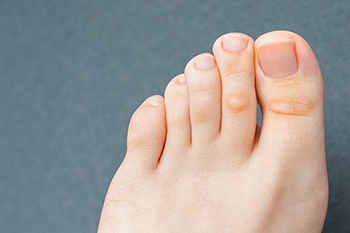
A corn is a small, hardened layer of skin that develops from excessive friction. Despite its small size, it can cause a considerable amount of discomfort. A corn can develop from wearing shoes that are too tight, and a common place to find a corn is on the pinky toe. They can also form on top of the toes with existing foot conditions such as hammer toe or bunions. Some people find that corns have developed between the toes, and these are referred to as soft corns. Mild relief may be found temporarily when a protective pad is worn over the corn. Additionally, it may be beneficial to change the type of shoes that are worn or to wear a different size. If corns are consistently developing, or if the pain level increases, it is suggested that you seek the counsel of a podiatrist who can provide you with correct treatment methods.
Corns can make walking very painful and should be treated immediately. If you have questions regarding your feet and ankles, contact Stanley Luksenburg, DPM of Home Foot Care. Our doctor will treat your foot and ankle needs.
Corns: What Are They? And How Do You Get Rid of Them?
Corns are thickened areas on the skin that can become painful. They are caused by excessive pressure and friction on the skin. Corns press into the deeper layers of the skin and are usually round in shape.
Ways to Prevent Corns
There are many ways to get rid of painful corns such as:
- Wearing properly fitting shoes that have been measured by a professional
- Wearing shoes that are not sharply pointed or have high heels
- Wearing only shoes that offer support
Treating Corns
Although most corns slowly disappear when the friction or pressure stops, this isn’t always the case. Consult with your podiatrist to determine the best treatment option for your case of corns.
If you have any questions please feel free to contact our office located in Fairway Park, OH . We offer the newest diagnostic and treatment technologies for all your foot and ankle needs.